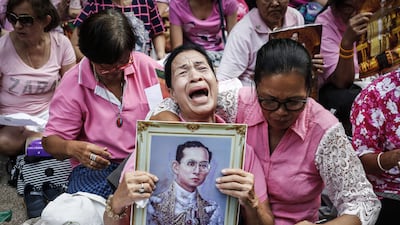BANGKOK // Thailand’s King Bhumibol Adulyadej was the revered “father of the nation” whose reign spanned seven politically turbulent decades, shielded by harsh defamation laws and an intense personality cult.
The world's longest-serving royal sovereign until his death on Thursday at the age of 88, Bhumibol rebuilt a near-extinct monarchy into one of the wealthiest and most powerful on the planet – and one whose roots go deep in modern-day Thailand.
Thailand’s absolute monarchy was abolished in 1932, but under the official title of King Rama IX, Bhumibol exercised a powerful moral authority and also a political one as his reign matured, albeit often away from the public eye.
Crowned in 1950, many analysts attribute his longevity during an era pock-marked with political violence to deep ties with a military that relied on his official endorsement of their repeated coups.
"He viewed it as a partnership for developing the country," said Paul Handley, author of the unauthorised biography The King Never Smiles, which is banned in Thailand.
The army’s latest power grab took place in May 2014, when it toppled the elected government of Yingluck Shinawatra.
Right up until his death after a long period of ill health, Bhumibol was seen as a unifying figure in the deeply divided country.
But the end of his reign will heighten fears of another eruption of the turmoil that has frequently blighted the kingdom since Ms Yingluck’s brother Thaksin was overthrown as prime minister in 2006.
The common touch
Helped by well-publicised rural development projects, the soft-spoken, bespectacled king enjoyed an image of a benevolent moral force in a kingdom with a long history of instability and political bloodshed.
That reputation was carefully embossed by ritual, a well-oiled propaganda machine and a tough royal defamation law.
In 2011, Forbes Magazine rated Bhumibol as the world's richest monarch.
But despite his wealth, the keen saxophonist, photographer and sailor – who won a gold medal for sailing at the 1967 Asian Games – was still seen as in touch with ordinary Thais.
“In the world of royalty he had a yacht that was five metres long, he had palaces but they were small,” said Handley.
“He didn’t surround himself with opulence and people respected him for it ... they saw him as a pure figure.”
Thais are taught about Bhumibol’s good works at school, cinema-goers have to stand for the royal anthem at the start of films, while people prostrated themselves, or crawled, in his presence.
Giant portraits of the king and queen pepper towns and cities across the country, while photos of the monarch adorn the walls of many Thai households.
Bhumibol remained widely popular up until his death despite spending much of his later life in hospital, where information on his deteriorating health was tightly controlled.
Born on December 5, 1927, in the United States, Bhumibol came to the throne aged 18 in 1946 when his brother was shot dead in mysterious circumstances at the Royal Palace in Bangkok.
He was crowned four years later after finishing his studies in Switzerland.
The same year, he married Queen Sirikit and they had four children – three girls and a boy, the heir to the throne, Crown Prince Maha Vajiralongkorn.
A country divided
But the hurly-burly of Thai politics dominated his long reign.
In the mid-1960s he travelled the country extensively to support the Thai armed forces’ fight against Communist insurgents.
That deepened Thailand’s already tight alliance with the United States, which was desperate to staunch the tide of communism in Southeast Asia.
In the 1970s the king intervened during several political crises, and in 1992 made a spectacular arbitration between the military and pro-democracy protesters when the leaders of the two camps bowed down before him, in a televised act of deference, and made peace.
The emergence of Thaksin Shinawatra, who was voted in as prime minister in 2001, shaped the political landscape of Bhumibol’s kingdom in the twilight of his reign.
The controversial billionaire was adored by many poor Thais but seen by the elite as self-serving, corrupt and a threat to the monarchy due to his popularity.
Mr Thaksin was toppled by the army in 2006.
Bhumibol remained largely silent during a military crackdown on pro-Thaksin “Red Shirt” protests in 2010 that left about 90 people dead and nearly 1,900 wounded in the heart of the capital, despite calls from some opposition figures for his intervention.
With avenues for criticism growing, particularly on social media, authorities strictly enforced Thailand’s harsh lese majeste laws, which carry a jail term of up to 15 years on each count for defaming the royals.
Dozens of cases have been driven through the courts in a dramatic surge in the number of prosecutions since a May 22, 2014, coup. Two separate rulings in August saw record 30 and 28-year sentences meted out for alleged lese majeste posts on Facebook.
The ruling junta says it is duty-bound to protect the reputation of the monarchy. But critics say the law has been used as a tool to crush dissent, with the regime’s political opponents in its crosshairs.
The throne is meant to pass to Crown Prince Maha Vajiralongkorn, who is untested and has not attained the popularity his father enjoys.
Even if the transition proceeds peacefully, observers say the palace could find itself compelled to swiftly modernise under increased scrutiny.
“Their father was protected by his image which was built up by his own works and the lack of internet ... [as well as the lack of] being able to pose questions about the monarchy,” said Handley.
“His children don’t have that choice.”
* Agence France-Presse

